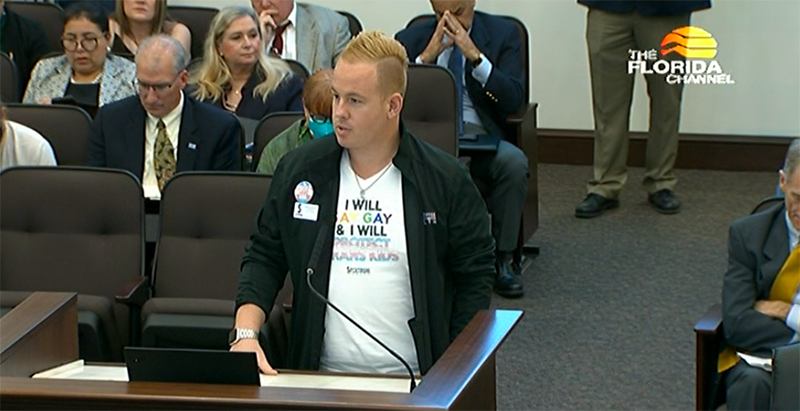Republican Senator Wanted to Soften So-Called ‘Don’t Say Gay’ Bill; His Colleagues Didn’t Want To

Get stories like this delivered straight to your inbox. Sign up for The 74 Newsletter
A Republican senator tried to get the sting out of a so-called “Don’t Say Gay” bill — which opponents claim would stifle conversations on LGBTQ issues in Florida’s public schools — but it didn’t work.
Following an outcry from LGBTQ Floridians, Sen. Jeff Brandes proposed an amendment to HB 1557 to decrease the focus on the LGBTQ community and center the legislation on the broader scope of human sexuality.
“If the intent is not to marginalize anyone let’s make sure we aren’t,” Brandes, of Pinellas County, told the Senate Appropriations committee on Monday.
But GOP colleagues weren’t convinced and the amendment failed. The bill soon will be considered on the Senate floor, and it’s likely to pass in the GOP-controlled Senate as Florida and other states are plowing through legislation that can create a chilling effect in classrooms.
HB 1557 is designed to limit how the LGBTQ community is discussed in public school classrooms by restricting conversations, considered “instruction,” particularly related to the youngest elementary children. But those limitations could be felt in higher grades.
Described as the so-called “Don’t Say Gay” bill by LGBTQ advocates, the legislation, which is nebulous, says that classroom “instruction” on “sexual orientation or gender identity may not occur in kindergarten through grade 3 or in a manner that is not age appropriate or developmentally appropriate for students.”
Sen. Brandes hoped to make a slight wording change — swap language that would place bans on instruction of “sexual orientation or gender identity” in kindergarten through 3rd grade classrooms with “human sexuality or sexual activity.”
“I think we can all agree…that discussions of sensitive subjects between kindergarteners and third graders should be best handled at home,” Brandes said at the Monday Senate Appropriations committee.
When the committee didn’t approve Brandes’ change, he expressed hope that a similar adjustment could be made on the Senate floor.
He said: “This bill has to go to the floor, we have the opportunity to soften this, to accomplish both goals: to ensure that these conversations can be had at home and to not impact our neighbors (the LGBTQ community).”
Joseph Knoll, who works with an LGBTQ healthcare facility called Spektrum Health, said that he is “deeply concerned” about the mental and physical health of kids potentially affected by the bill.
“I do agree that conversations should be age appropriate, but I do not agree that we should be adopting into law any discriminatory language that would single out specific people,” Knoll said.
Another concern is the push to increase parents’ access to information on their students.
The bill allows parents to sue school districts if they are not privy to situations related to their children or if their students are encouraged to have discussions on sexual orientation and gender identity, continuing the philosophy of Florida’s new Parents’ Bill of Rights law that parents have a right to direct the upbringing and education of their child.
But during public testimony on Monday, LGBTQ students, educators and advocates worry that students would not confide in educators and school staff for fear of being ‘outed’ to an unsupportive family.
A high schooler from Orange County named Will Larkins, told the committee that some parents are not supportive of their LGBTQ children.
“I’ve heard different members of the Legislature something along the lines of ‘parents know what’s best for their kids.’ When it comes to the queer community that is not true,” Larkins said. “If parents know what’s best for their kids, why did my best friend get kicked out of his house and have to live with me? Larkins continued: “Why do some many kids get abused for their sexuality and gender identity?”
Senate sponsor Dennis Baxley, a Republican who represents areas in Central Florida, said the outrage about the legislation is “fabricated by the media” and overblown.
“This (HB 1557) does one simple thing —it decides who’s in charge,” Baxley continued. “And I believe it is imperative, if we love children that we put parents in charge. And that these intimate decisions with their lives should not be made by an institution. They should be made in a family if at all possible.”
He also said that the bill protects against what he calls “social engineering” and brings “sensitive conversations” back to the parents.
Senate Minority Leader Sen. Lauren Book argued that teachers are not indoctrinating students.
“These (educators) are professionals who have gone to school for years and years. They have degrees, many of them with advanced degrees. We trust them with everything,” Book said.
Florida Phoenix is part of States Newsroom, a network of news bureaus supported by grants and a coalition of donors as a 501c(3) public charity. Florida Phoenix maintains editorial independence. Contact Editor Diane Rado for questions: info@floridaphoenix.com. Follow Florida Phoenix on Facebook and Twitter.
Get stories like these delivered straight to your inbox. Sign up for The 74 Newsletter

;)